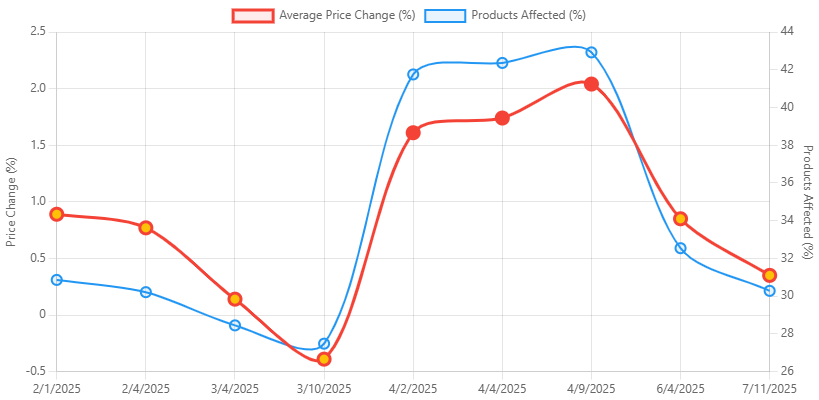Trade War Announcements Triggered Price Hikes From Retailers Months Before US Tariffs Took Effect
New research reveals retailers raised prices five times faster during the 2025 trade war period than under regular market conditions
VILNIUS, LT / ACCESS Newswire / November 20, 2025 / A new research report from IPRoyal has revealed that reciprocal tariffs during the 2025 US-China trade war triggered price rises. This included a 1.8% rise on average, with some categories reaching 2.04% (compared to a 0.39% baseline), weeks before any tariffed goods could reach store shelves.
2-week price increases before, during, and after the Trade War
The research conducted a comprehensive analysis of 1,900 consumer products and tracked prices across 19 product categories (100 products per category) from September 2024 to August 2025. The findings challenge conventional assumptions about how tariffs affect consumer prices.
The key findings from the research included:
During Liberation Day (April 2nd, 2025) and the subsequent trade war period (until May 12th, 2025), prices increased at a rate of up to 2.04% per two-week period, more than five times the baseline rate of 0.39%.
Nearly 43% of all tracked products showed price increases during the trade war period.
Unilateral tariffs had a minimal impact, with an average increase of only 0.44%.
Actual supply chain disruptions from Red Sea shipping attacks produced no measurable price effects.
21% of product categories that experienced the April price spikes later reverted to below-baseline prices.
"It is clear from the research conducted that trade war policy announcements may have a previously underappreciated effect on prices," said Justas Vitaitis, the project's Lead Researcher. "While a corporate greed narrative may seem enticing, our findings are just as important to policymakers.
"Over the six weeks of the 2025 trade war, U.S. consumers paid elevated prices on goods already purchased at pre-tariff costs. Yet, putting the entire blame on retailers would be akin to blaming investors for selling stocks during periods of financial uncertainty. There were other market forces at play, and policymakers should adapt accordingly."
The research also found that the manner of tariff announcement, such as the unprecedented scope, high visibility, and explicit "trade war" framing of Liberation Day, created conditions where widespread price increases faced minimal competitive pressure.
"For consumers, the implications were significant: during the six-week trade war period, shoppers paid elevated prices on pre-tariff inventory, transferring wealth to retailers as windfall profits rather than to governments as intended tax revenue.
"Overall, it is clear that high-profile, politically charged tariff announcements produce bigger and faster price hikes than quietly implemented policies. The way trade policies are announced may harm consumer welfare more than tariffs themselves, and should be considered in the future", concluded Vitaitis.
Read the full research: https://iproyal.com/trade-wars-and-price-hikes.pdf
ABOUT THE RESEARCH
The study analyzed pricing data from Keepa, tracking 100 products in each of 19 randomly selected Amazon categories. Researchers have no affiliation with Keepa.
Media Contacts:?
Benjamin Hart / Sasha Arion
Spreckley
Tel: (0)207 388 9988
Email: [email protected]
Contact Information:
Benjamin Hart
PR Manager
[email protected]
(0)207 388 9988
SOURCE: IPRoyal
Information contained on this page is provided by an independent third-party content provider. XPRMedia and this Site make no warranties or representations in connection therewith. If you are affiliated with this page and would like it removed please contact [email protected]

